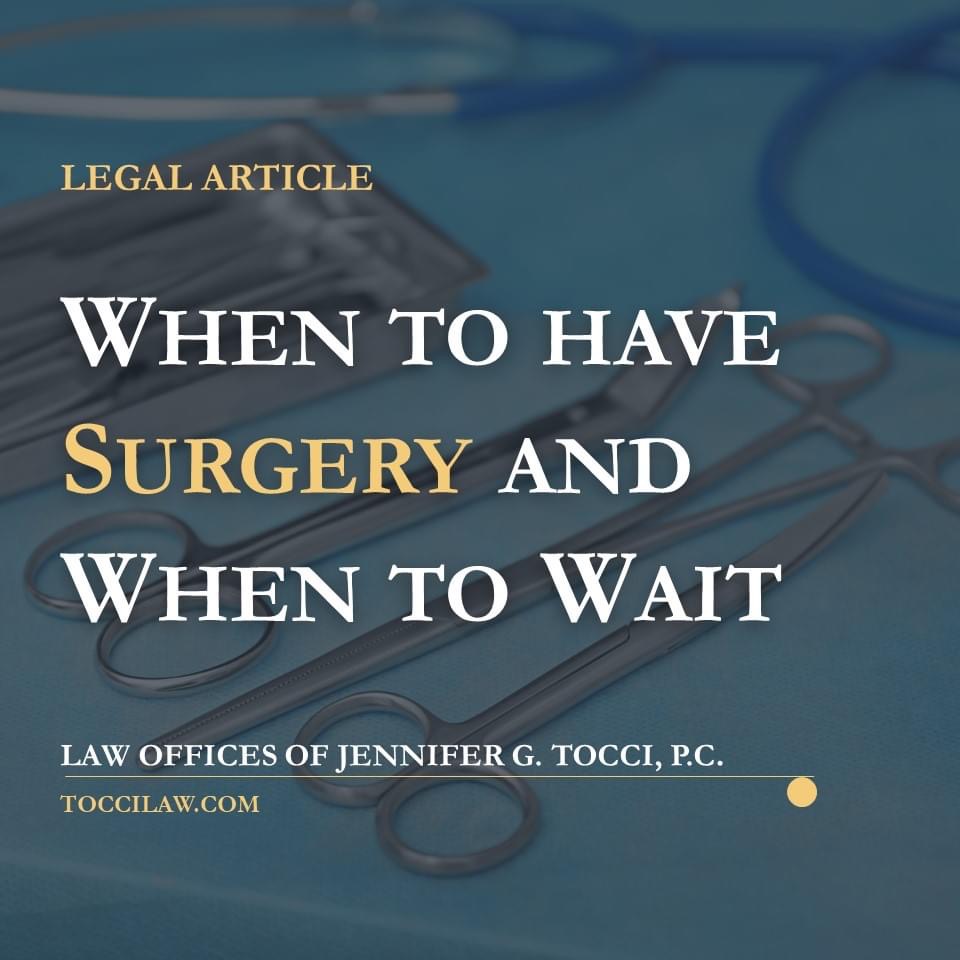What do you do if you’ve been injured in an accident and your physician is prescribing surgery? If your physician is recommending surgery after an accident and you are trying to decide your best course of action, read this first. While the advice below is commonsensical, it may assist in making a logical decision, rather than one that is based on fear or uncertainty.
When surgery is immediately necessary:
In emergency situations, you may not have the luxury of assessing your options. In urgent and emergency situations, delaying surgery or treatment could be detrimental to your health. In the most serious situations, physicians do not need your consent or approval to administer surgical treatment if doing so is necessary to save your life or body function. Decisions are best left for situations where time will not have a negative effect on your health. For example, when you have been treating for several months with less invasive procedures in hopes of recovery. If surgery is necessary to save your life, you must have surgery. If surgery is required to save the use and function of a body part, so long as the surgery is not likely to damage you further, surgery is necessary. In such events, your physician should express to you and your family the urgency and necessity of the procedure(s).
What if you initially did not require surgery after your accident, but now you do?
Unless you require emergency or urgent surgery and it is immediately apparent that you’re unlikely to heal without surgical repair, your physician may wait to prescribe surgery. In non-critical situations, physicians frequently prefer to wait and see whether you respond positively to less invasive treatment. In some cases, the passage of time allows the physician to further identify the extent of your injuries and provide a more accurate diagnosis. Certain injuries, such as small tears and non-displace fractures often take time to appear in diagnostic films. However, when non-invasive and less-invasive treatment is no longer effective or appropriate, your physician may determine you require surgical repair.
The choice to undergo surgery should be a well thought out and informed decision. It is smart to discuss the risks and potential outcomes with your physician. Surgery always involves risk, even if you are healthy. Therefore, it is important to weigh the costs and benefits associated with undergoing a surgery based upon the severity of your injuries and the likelihood of healing without surgical intervention. If you are uncomfortable with your physician, the procedure, or feel you are not fully informed, seek a second opinion from a different physician. Even if the second opinion (or third) recommends the same surgical options, selecting a surgeon who you prefer can make the world of difference in your experience.
Non-surgical treatment has not worked:
It may be advantageous to undergo surgery when you have exhausted all practical non-surgical options and were unsuccessful or reeped minimal improvement. Another strong reason to have surgery is if your condition is worsening, and as a result, your quality of life is being affected. Pain affects your quality of life and is no way to live. Limited function and movement of a body part, whether resulting from pain or inability, inhibits your quality of life and your ability to perform your normal activities. In extreme cases, where you may be losing independence or relying on others as a result of your injuries, surgery may be extremely beneficial. When considering surgery after an accident, the goal is to restore normalcy to your body and life as much as possible and as soon as possible. Needless delays serve no purpose and may even be detrimental, especially if continued use to the affected area could be further damaged.
Surgery is required but you can wait:
It is smart to have surgery in a case where you will inevitably need to have surgery. This is the scenario where your physician advises you that the surgery is required, but you can wait to have it. Further damage to the affected area is unlikely, but healing is also unlikely. People tend to put this type of surgery off for long periods of time. Scheduling the surgery is influenced by children and work and held off until convenient. While you may consider the costs associated with undergoing surgery, remember to factor in the cost of not having surgery. Years of pain and suffering may be worth the operation, along with the costs that will accumulate over time after resolution. In addition to the relief to the body, delaying surgery could have an economic effect on your life. If you start to or plan to start an action for personal injuries, waiting to have surgery can affect your recovery. The same injury operated on earlier may be worth more because it appears more crucial. Whether you plan to seek judicial intervention or not, having surgery years down the road, that should be done earlier in time, could shift the medical cost burden to you.
When to wait to undergo surgery:
Injuries, even those that are serious, do not always require surgical repair. It is smart to wait to have surgery if you have not yet explored your non-surgical options. Physical therapy, occupational therapy, pain management and other rehabilitating treatments can, in some cases, resolve your symptoms and injuries. An operation (at this juncture) may be too aggressive. Surgery always involves risk, and if the same results can be achieved by less invasive means, the risk does not outweigh the benefit. Waiting may be best where your injury is not severe, does not cause pain, is not likely to worsen, and does not inhibit your life. Being involved in an accident and sustaining injuries already effects your life and daily routine in itself, undergoing surgery may result in more time off work and an extended recovery time. If the operation is not going to resolve your issue or is not expected to yield favorable results, you may wish to wait.
Age and overall health:
Age influences how your body reacts to injuries and responds to treatment. Advanced age may put you at a greater risk for serious surgical complications the benefit gain from surgery may be outweighed by the potential risk. Furthermore, injuries can be exacerbated by age. If you suffer from arthritis or pre-existing conditions you may feel worse, requiring surgery to minimize pain and suffering. Younger individuals generally heal faster. An injury that a twenty-year old could overcome with physical therapy may not be the case for older individuals. Take into consideration the number of surgeries you have had in your lifetime and the anticipated surgeries. Procedures for health conditions may take precedent over injuries and vice versa. If you are medically able, it is generally best to wait until you are fully recovered from a previous surgery before undergoing other surgery. This is especially true if the injury is near the same area of the body as your previous operation. However, medical necessity should dictate the order in which surgeries are performed. In any case, consider the duration of the surgery required, the size of the injured area, the recovery time, and if any additional surgeries or treatments will be required in the future.
For children, injuries that are not corrected early, can lead to serious complications down the road. Incorrect posture, gait, speech impediments, and other manifestations of non-corrected injuries could cause added complications in the future. Contrarily, children and young adults may heal faster and not require as aggressive treatment. If your child has been injured or you are a young adult, take the time to learn the long-term effects of all treatment options. Thoroughly discus these options with your doctor. Children and young adults have a lifetime to spend with the consequences.
I have been in a car accident, should I get surgery on my injuries?
There is a big misconception concerning the reason you should get surgery for personal injuries sustained in a motor vehicle accident. While you may be advised by an attorney that undergoing surgery may result in a larger settlement in your personal injury matter, it may not be the best decision for your health and wellbeing. Undergoing surgery should never be influenced by the potential amount of money you may recover, nor does it dictate a set amount of recovery. Every motor vehicle accident is different along with the merits of the case. There are many aspects of a personal injury lawsuit that affect your case’s value (i.e. liability).
Some injuries can be treated by consistent treatment and physical therapy; however, some injuries require surgeries that are absolutely necessary to fully recover. If you are involved in a personal injury lawsuit, and do in fact need surgery, it is important to not settle your personal injury matter until after having the surgery. This is because there is a chance the surgery did not fix the injury or fix the injury in its entirety, resulting in more medical expenses down the line. Also, there may be some injuries that arise that were related to the accident, that was not immanent at first, that may need medical attention.
If your physician is recommending surgery or you underwent a surgical procedure, schedule a complimentary consultation to discuss your rights and options (631) 343-7676 Law Offices of Jennifer G. Tocci, P.C., 353 Veterans Memorial Highway, Suite 200, Commack, New York 11725.
This legal article is not medical advice and should not be construed as such.










